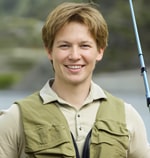Though often used synonymously, angling and fishing are two terms that carry unique philosophies and methodologies that appeal to distinct groups of enthusiasts. In this article, we will unravel the intricate differences between angling and fishing.
You can also check out the table below for an overview of the differences between angling vs fishing.
| Aspect | Angling | Fishing |
| Focus | Recreation or sport | Recreation or commercial |
| Equipment | Angling equipment | Utilizes a wide range of equipment |
| Catch Purpose | Catch-and-release | Consumption or sale |
| Techniques | Spinning, fly fishing, and bait fishing | Net fishing, trawling, longlining, and more. |
Page Contents
Overview
Angling requires skillful technique, involving specialized angling equipment and refined methods like fly fishing or baitcasting while emphasizing the art of bait and lure manipulation.
The synonym for angling is sport fishing. This also explains why catches are released in angling fishing.
Meanwhile, fishing encompasses a broader range of approaches, from casual shoreline casting to more technical methods.
This also explains the difference between an angler and a fisherman. An angler is also a fisherman, but a fisherman may not be an angler.
Difference Between Angling and Fishing
1. Techniques
- Angling: Angling means deploying a fishing rod, reel, and line. This approach involves casting bait or lures into the water. Anglers wield their expertise to manipulate the bait’s movements and allure fish.
- Fishing: In contrast, “fishing” is a broader umbrella encompassing various methods, including angling, netting, trapping, spearing, and more.
2. Target Fish
- Angling: The angler’s focus typically gravitates toward specific fish species, often those renowned for their tenacious resistance, such as bass, trout, salmon, and catfish.
- Fishing: Fishing extends its reach to a more comprehensive selection of fish, encompassing both game fish pursued sport, and commercial species sought for sustenance or economic gain.
3. Skills
- Angling: Proficiency in angling demands a keen comprehension of fish behavior, aquatic conditions, and bait presentation.
- Fishing: Diverse fishing methods entail varying skill sets. For instance, fishermen fishing using nets require knowledge of fish migratory patterns, while spearfishing mandates breath-holding and underwater navigation proficiency.
4. Costs
- Angling: Angling remains relatively accessible in terms of cost, with the essentials encompassing a fishing rod, reel, and rudimentary tackle.
- Fishing: The financial outlay spans a wide spectrum, contingent on the method and objective.
5. Pros and Cons of Angling and Fishing
1. Angling
- Quiet and Relaxing: Angling is usually a quieter and more contemplative activity.
- Minimal Environmental Impact: Angling tends to have a smaller ecological footprint than other fishing forms.
- Social Interaction: Angling can be a social activity, providing opportunities for bonding and camaraderie with fellow anglers.
- Time-Intensive: Angling can be time-consuming, requiring patience and waiting for fish to bite.
- Skill Learning Curve: The skills required for successful angling can take time to develop.
- Weather Dependency: Weather conditions can significantly impact angling success.
2. Fishing
- Diverse Techniques: Fishing encompasses various methods, from angling to netting, trapping, and spearfishing.
- Higher Catch Rates: Depending on the fishing method and location, fishing can often yield higher catch rates than angling.
- Cultural and Culinary Aspect: Fishing can have cultural and culinary significance, as many people enjoy catching their own seafood for consumption.
- Environmental Impact: Some fishing methods, such as certain types of netting, can have significant environmental consequences, including bycatch and habitat destruction.
- Overfishing Risk: If not managed properly, fishing can lead to overfishing and the depletion of fish populations, which can have long-term ecological impacts.
- Legal Restrictions: Fishing regulations and restrictions can be complex and vary by location, requiring anglers to stay informed and adhere to guidelines to avoid legal issues.
Which Activity is Right for You?
When deliberating between angling and fishing, factoring in several key aspects to align your choice with your preferences and priorities is essential.
1. Technique and Skill
- Angling: This method demands finesse in using specialized gear like rods, reels, lines, and bait to mimic natural prey movement, requiring precision and timing for a successful catch.
- Fishing: Fishing encompasses nets, traps, and spears to time-honored practices like handlines or modern approaches like trolling with motorized boats. Techniques vary based on the target species and the location.
2. Equipment Selection
- Angling: Anglers typically use purpose-designed fishing rods, reels, lures, flies, or bait. The equipment used here can be sophisticated, tailored to specific fish species, or aligned with individual angling preferences.
- Fishing: Fishing employs equipment that can be more diverse and adaptable, depending on the chosen method. Nets, traps, spears, and other tools might be utilized.
Conclusion
The debate over angling vs fishing offers several perspectives on catching aquatic species. Both pastimes involve enjoying the outdoors, but their methods and environmental implications differ.
Angling is praised for requiring skill, patience, and a profound understanding of fish behavior. Anglers prioritize capture and release, which helps fish populations and delicate aquatic habitats.
Fishing, on the other hand, seeks nourishment and is often done on a larger scale to suit commercial needs. This type of fishing supports many communities, but if not done sustainably, it can lead to overfishing and environmental destruction.

Hi, I’m Thomas Kirk. As someone who loves fishing, I am here to offer everyone help on all aspects of angling, whether it’s preparing live bait or determining when to crank in a fish. As you go through the guides here, feel free to let us know your thoughts and any topics you want to learn more about.







